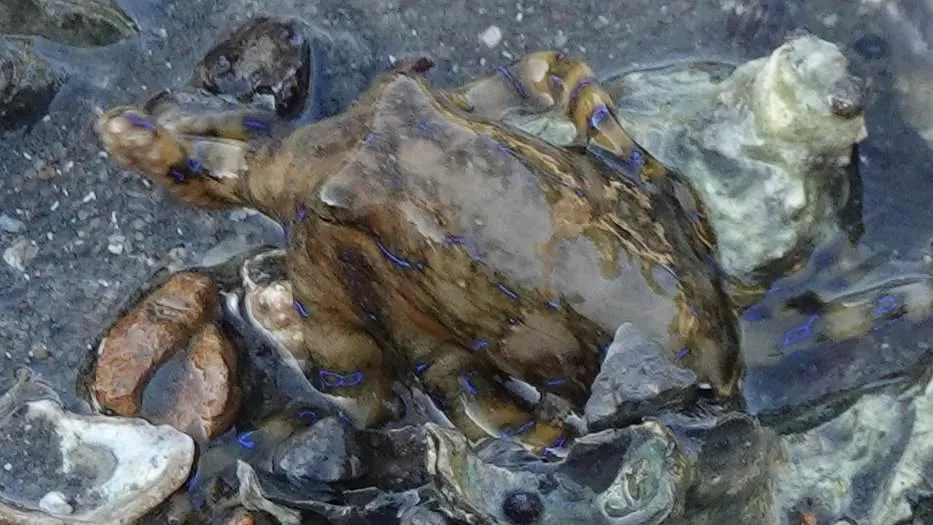A deadly blue-ringed has been spotted in a densely-populated section of the Parramatta River in Sydney's inner west for the first time since the 1960s.
The golf ball-sized creature was found at Callan Park, about 14km inland from Bondi Beach, during an ecological survey commissioned by Inner West Council.
It was photographed in February and its discovery was announced on social media this week.
Inner West Council is keeping the precise location of the distinctive-looking mollusc secret so that members of the public do not try to interfere with it.
The animal is one of four species of the extremely venomous blue-ringed octopus and is known as a blue-lined octopus due to its non-circular markings.
Blue-lined octopuses (Hapalochlaena fasciata) are found in Pacific Ocean waters stretching from Australia to Japan, most commonly between southern Queensland and southern NSW.
They are generally seen around intertidal rocky shores and coastal waters to a depth of 15metres and are regarded as one of the most dangerous creatures in the sea.
Parramatta River Catchment Group coordinator Alexi Gilchrist told Daily Mail Australia the appearance of a blue-lined octopus at Callan Park was historically significant.
A deadly blue-ringed has been spotted in a densely-populated section of the Parramatta River in Sydney's inner west for the first time since the 1960s. The octopus is pictured
'This is the first recorded sighting in the Inner West since the 1960s,' Mr Gilchrist said.
'The return of the octopus, and other wildlife, to the river is confirmation of improved water quality and river health.'
Normally a mottled yellow-brown colour with dark streaks covering its body, the octopus’s bright blue lines appear when it feels threatened by predators.
The saliva of the critter contains a neurotoxin called tetrodotoxin so lethal it has been estimated the venom from just one 25g octopus can kill ten 75kg humans.
Blue-lined octopuses are more likely to flee and seek shelter if disturbed and they pose the greatest threat if picked up and handled.
Symptoms of a bite include loss of feeling in the tongue and lips, muscle weakness followed by paralysation, respiratory failure and unconsciousness.
There have been at least three reported human deaths attributed to a blue-lined octopus sting.
Mr Gilchrist said the octopus’s only used its venom as a ‘last line of defence’.
The golf ball-sized creature was found at Callan Park, about 14km inland from Bondi Beach, during an ecological survey commissioned by Inner West Council.
'While these small octopus are one of the most dangerous species, bites to humans are rare,' he said.
'The species is extremely shy and flees from potential predators and changes colour to camouflage itself.'
Inner West Council's Facebook post about the blue-lined octopus attracted comments about other sightings of the cephalopod in the river.
One user said he had asked City of Canada Bay Council to erect warning signs after his family encountered the octopuses at Cabarita twice in the past few weekends.
There were other reported encounters at Hunters Hill, Abbotsford, Five Dock, Dobroyd Point, Drummoyne, Balmain, Gladesville and Iron Cove over the past 20 years.
Mr Gilchrist said there was no central data-base of wildlife sightings but noted the anecdotal reports of blue-lined octopuses in other parts of the river.
'Official records of confirmed sightings extend as far up-river as Iron Cove,' he said.
'As they are a coastal species, they are restricted to the tidal rockpools of the outer harbour and won't occur naturally in the upper estuary.'
Blue-ringed octopuses are more likely to flee and seek shelter if disturbed and they pose the greatest threat if picked up and handled
Mr Gilchrist added there had been other examples of unusual native wildlife recently detected in the area.
'There are a number of interesting fauna sightings in the river,' he said.
'Seal sightings occur between Mortlake and Gladesville, referred to by Ryde residents as Silvio the Seal. We don’t know if it is one or multiple seals.'
'During visual assessment as part of a sea horse reintroduction project by the Harbour Trust, ecologists found white seahorse in the vicinity where they planning to install seahorse hotels.'
Anyone bitten by any species of blue-ringed octopus should seek immediate medical attention.
There is no antivenom for a blue-ringed octopus bite but severe symptoms can be treated with ventilation, intubation and intravenous fluids.
